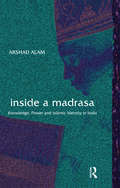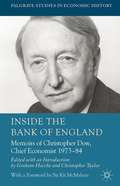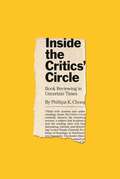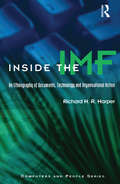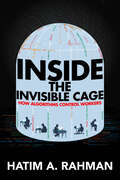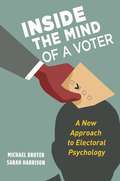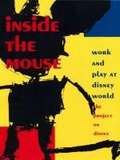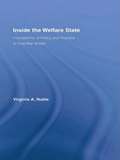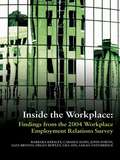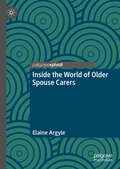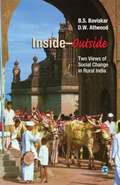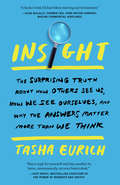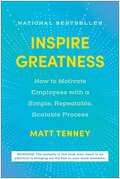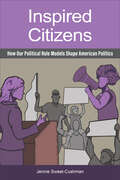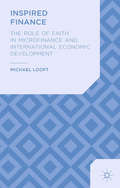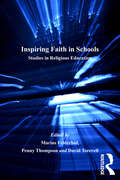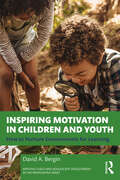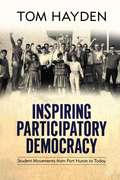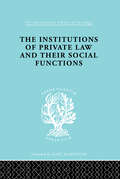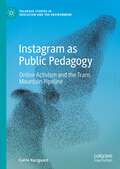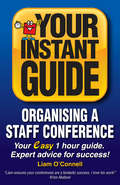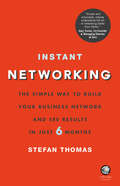- Table View
- List View
Inside a Madrasa: Knowledge, Power and Islamic Identity in India
by Arshad AlamWhile there exists scholarly works on madrasas in India during medieval times and the colonial period, there is hardly anything on the conditions of madrasas today, and those are by and large based on secondary literature and not grounded in detailed empirical investigation. This work, through ethnographic study undertaken at two madrasas in Mubarakpur in Uttar Pradesh, shows how Indian madrasas represent a diverse array of ideological orientations which is mostly opposed to each other’s interpretation of Islam. If madrasas are about the dissemination of Islamic knowledge, then they also problematize and compete over how best to approach that knowledge; in the process they create and sustain a wide variety of possible interpretations of Islam. This volume will be of interest to scholars and researchers interested in the study of Islam and Indian Muslims. Since it is multidisciplinary in approach, it will find space within the disciplines of sociology, social anthropolgy, history and contemporary studies.
Inside the Bank of England
by Christopher Taylor Graham HaccheA personal memoir from Christopher Dow, an influential British economist and a key player in the banking establishments of the post-war era. Contains insights and revelations into the issues and protagonists shaping British economic policy in the late 20th Century.
Inside the Critics’ Circle: Book Reviewing in Uncertain Times (Princeton Studies in Cultural Sociology #81)
by Phillipa K. ChongAn inside look at the politics of book reviewing, from the assignment and writing of reviews to why critics think we should listen to what they have to sayTaking readers behind the scenes in the world of fiction reviewing, Inside the Critics’ Circle explores the ways that critics evaluate books despite the inherent subjectivity involved, and the uncertainties of reviewing when seemingly anyone can be a reviewer. Drawing on interviews with critics from such venues as the New York Times, Los Angeles Times, and Washington Post, Phillipa Chong delves into the complexities of the review-writing process, including the considerations, values, and cultural and personal anxieties that shape what critics do.Chong explores how critics are paired with review assignments, why they accept these time-consuming projects, how they view their own qualifications for reviewing certain books, and the criteria they employ when making literary judgments. She discovers that while their readers are of concern to reviewers, they are especially worried about authors on the receiving end of reviews. As these are most likely peers who will be returning similar favors in the future, critics’ fears and frustrations factor into their willingness or reluctance to write negative reviews.At a time when traditional review opportunities are dwindling while other forms of reviewing thrive, book reviewing as a professional practice is being brought into question. Inside the Critics’ Circle offers readers a revealing look into critics’ responses to these massive transitions and how, through their efforts, literary values get made.
Inside the IMF
by Richard HarperIn this book, Richard Harper uses the International Monetary Fund as a case study to show how thinking differently about IT systems can dramatically improve the manageability and accessibility of documents in organisations. The systems he considers uses search and retrieval applications, the use of hypertext documents and shared database applications like Lotus Notes.
Inside the Invisible Cage: How Algorithms Control Workers
by Hatim RahmanIn a world increasingly run by algorithms and artificial intelligence, Hatim Rahman traces how organizations are using algorithms to control workers in an "invisible cage." Inside the Invisible Cage uses unique longitudinal data to investigate how digital labor platforms use algorithms to dictate the actions of high-skilled workers by determining accepted behaviors, work opportunities, and even success. As Hatim Rahman explains, employers can use algorithms to shift rules and guidelines without notice, explanation, or recourse for workers. The invisible cage signals a profound shift in the way markets and organizations categorize and ultimately control people. Unlike previous forms of labor control, the invisible cage is ubiquitous, yet it is also opaque and shifting, which makes breaking free from it difficult for workers. This book traces how the invisible cage was developed over time and the implications it has for the spread of new technology, such as generative artificial intelligence. Inside the Invisible Cage also provides organizations, workers, and policymakers with insights on how to ensure the future of work has truly equitable, mutually beneficial outcomes.
Inside the Mind of a Voter: A New Approach to Electoral Psychology
by Sarah Harrison Michael BruterAn in-depth look into the psychology of voters around the world, how voters shape elections, and how elections transform citizens and affect their livesCould understanding whether elections make people happy and bring them closure matter more than who they vote for? What if people did not vote for what they want but for what they believe is right based on roles they implicitly assume? Do elections make people cry? This book invites readers on a unique journey inside the mind of a voter using unprecedented data from the United States, the United Kingdom, Germany, France, South Africa, and Georgia throughout a period when the world evolved from the centrist dominance of Obama and Mandela to the shock victories of Brexit and Trump. Michael Bruter and Sarah Harrison explore three interrelated aspects of the heart and mind of voters: the psychological bases of their behavior, how they experience elections and the emotions this entails, and how and when elections bring democratic resolution. The authors examine unique concepts including electoral identity, atmosphere, ergonomics, and hostility.From filming the shadow of voters in the polling booth, to panel study surveys, election diaries, and interviews, Bruter and Harrison unveil insights into the conscious and subconscious sides of citizens’ psychology throughout a unique decade for electoral democracy. They highlight how citizens’ personality, memory, and identity affect their vote and experience of elections, when elections generate hope or hopelessness, and how subtle differences in electoral arrangements interact with voters’ psychology to trigger different emotions.Inside the Mind of a Voter radically shifts electoral science, moving away from implicitly institution-centric visions of behavior to understand elections from the point of view of voters.
Inside the Mouse: Work and Play at Disney World
by The Project on DisneyThis entertaining and playful book views Disney World as much more than the site of an ideal family vacation. Blending personal meditations, interviews, photographs, and cultural analysis, Inside the Mouse looks at Disney World's architecture and design, its consumer practices, and its use of Disney characters and themes. This book takes the reader on an alternative ride through "the happiest place on earth" while asking "What makes this forty-three-square-mile theme park the quintessential embodiment of American leisure?" Turning away from the programmed entertainment that Disney presents, the authors take a peek behind the scenes of everyday experience at Disney World. In their consideration of the park as both private corporate enterprise and public urban environment, the authors focus on questions concerning the production and consumption of leisure. Featuring over fifty photographs and interviews with workers that strip "cast members" of their cartoon costumes, this captivating work illustrates the high-pressure dynamics of the typical family vacation as well as a tour of Disney World that looks beyond the controlled facade of themed attractions. As projects like EuroDisney and the proposed Disney America test the strength of the Disney cultural monolith, Inside the Mouse provides a timely assessment of the serious business of supplying pleasure in contemporary U.S. culture. Written for the general reader interested in the many worlds of Disney, this engrossing volume will also find fans among students and scholars of cultural studies.
Inside the Welfare State: Foundations of Policy and Practice in Post-War Britain (British Politics and Society)
by Virginia NobleBy moving beyond consideration of the welfare legislation enacted in the 1940s, this book explains how government aid was actually provided in the new British welfare state created just after World War II. Revealing dimensions of social policy that have been neglected by scholars, this study uncovers the practices of the officials who decided how welfare would be distributed. Between 1945 and 1965, social policy was in a state of flux, as officials sought to reconcile the new welfare state’s message of unqualified inclusion with deeply ingrained norms that militated against providing state aid to working-age men, to women who had even a tenuous connection to a male wage-earner, or to black and Asian immigrants who lacked an authentic "British" identity. Fusing the rationales of the poor law and the technologies of the modern bureaucratic state, various government branches tried to shape the behavior and attitudes of those seeking benefits. These mechanisms of welfare distribution created a bureaucratic language and logic that foreshadowed the more publicized, politicized anxieties that would surface as the welfare state itself came under attack later in the 20th century.
Inside the Workplace: Findings from the 2004 Workplace Employment Relations Survey (Urn 05/1057 Ser.)
by Alex Bryson John Forth Barbara Kersley Carmen Alpin Sarah Oxenbridge Helen Bewley Gill DixBased on the primary analysis of the 2004 Workplace Employment Relations Survey (WERS 2004), this is the fifth book in the series which began in 1980, and which is considered to be one of the most authoritative sources of information on employment relations in Great Britain. Interviews were conducted with managers and employee representatives in over 3,000 workplaces, and over 20,000 employees returned a self-completion questionnaire. This survey links the views from these three parties, providing a truly integrated picture of employment relations. This book provides a descriptive mapping of employment relations, examining the principal features of the structures, practices and outcomes of workplace employment relations. The reader can explore differences according to the characteristics of the workplace and organization, including workplace size, industrial sector and ownership. Current debates are examined in detail, including an assessment of the impact of the Labour Government's programme of employment relations reform. A key reference from a respected and important institution, this book is a valuable 'sourcebook' for students, academics and practitioners in the fields of employee relations, human resource management, organizational behaviour and sociology. Visit the Companion website at http://cw.routledge.com/textbooks/0415378133/
Inside the World of Older Spouse Carers
by Elaine ArgyleThis book explores the experiences of older people who provide care within marriage, highlighting the neglected role of older spouse carers and the positive social contributions they make. Drawing on relevant data, literature and research including in-depth interviews conducted with 26 older spouse carers, the author challenges classed, gendered, and other assumptions and expectations around older age and unpaid caring. These include the beliefs that older age is a time of passivity and dependency, that caring is a primarily female role that transcends class divides and that this caring is a normal part of the spousal relationship and not worthy of special attention. In addition to challenging these assumptions, the book will consider the implications of findings for service provision. This book will be of interest to scholars and researchers in Social Care, Sociology, Gerontology, and Gender Studies. In addition, practitioners and policy makers may also find this book of interest.
Inside-Outside
by D W Attwood B S BaviskarPoverty in rural India: Is this a permanent condition? Are villagers immobilized by a rigid caste system, limited resources and economic exploitation? This book is about villagers who have done remarkable things with their lives--people who have broken the constraints of poverty and inequality to become innovative and mobile. It is written partly by one villager who found a career doing research on social change. Inside-Outside narrates stories of grassroots change and innovation. These stories are discussed from the combined view of an insider (Baviskar), who grew up in a village in western India, and an outsider (Attwood), who came to study social change in the same region. Telling life stories from people who taught and surprised them, they challenge common stereotypes about Indian villagers--stereotypes of passivity, fatalism, and stagnation. Baviskar's life and experience of change in his home village exemplify grassroots initiative and innovation. He was born as the son of an impoverished farmer in a drought-stricken village in western Maharashtra. Ability, hard work, and some dramatic twists of fate enabled him to attend college and then complete a doctorate in India's premier sociology department. In contrast to Baviskar, Attwood is a complete outsider, having grown up in a suburb near Chicago, in the US heartland. He stumbled into anthropology and spent several years in India, doing fieldwork in the region where Baviskar grew up. The two met in 1969; they became friends and began four decades of collaborative research. Here they tell the stories of villagers who changed their own lives and who also, in many cases, changed the lives of others. These stories describe rapid innovation and institution-building in the countryside, challenging an array of common stereotypes about village life in India. Seeking explanations for change, it helps to look at village life from many angles. Inside and outside views are complementary and provide a more complete picture.
Insidious Capital: Frontlines of Value at the End of a Global Cycle (Dislocations #35)
by Don KalbWith a team of anthropologists and geographers, Insidious Capital explores “value and values” in what may well be the last phase of capitalist globalization. In a global perspective of fast transforming social spaces that move from East to West, the book explores the struggles around the exploitation and valuation of labor, environmental politics, expansion of the ground rent, new hierarchies, the contradictions of higher education, the off shoring of “immaterial” labor, the illiberal right, and the mobilizations against it. This is a book about the variegated frontlines of value within an uneven, but not random, geography of capitalist expansion.
Insidious Workplace Behavior (Applied Psychology Series)
by Jerald GreenbergInsidious Workplace Behavior (IWB) refers to low-level, pervasive acts of deviance directed at individual or organizational targets. Because of its inherently stealthy nature, scientists have paid little attention to IWB, allowing us to know very little about it. With this book, that now is changing. The present volume - the first to showcase this topic - presents original essays by top organizational scientists who share the most current thinking about IWB. Contributors examine, for example, the many forms that IWB takes, focusing on its antecedents, consequences, and moderators. They also highlight ways that organizational leaders can manage and constrain IWB so as to attenuate its adverse effects. And to promote both theory and practice in IWB, contributors also discuss the special problems associated with researching IWB and strategies for overcoming them. Aimed at students, scholars, and practitioners in the organizational sciences - especially industrial-organizational psychology, organizational behavior, and human resource management - this seminal volume promises to inspire research and practice for years to come.
Insight: How Small Gains in Self-Awareness Can Help You Win Big at Work and in Life (Expert Thinking Ser.)
by Tasha EurichThe first definitive book exploring the science of self-awareness, the meta-skill of the 21st century, Insight is a fascinating journey into everyone's favorite topic: themselves. Do you know who you really are? Do you ever wonder how other people really see you? Though we are usually confident that we do, we are wrong more often than we think. And if we could see ourselves through others’ eyes, we might be really surprised. Yet regardless of our line of work or stage of life, success depends on understanding who we are and how we come across. Research shows that self-awareness means better work performance, smarter life choices, deeper, more meaningful relationships, and a more fulfilling career. There’s just one problem: people can be remarkably poor judges of their behavior, performance, and impact on others. And despite the lip service given today to “feedback,” in the business world and beyond, it’s rare to get candid, objective data on what we’re doing well, and where we could stand to improve. Of course, at work and in life, we’ve all come across people with a stunning lack of self-awareness—but how often do we consider whether we might have the same problem? And if we did, how would we even know it?Drawing on her three-year, first-of-its-kind study of people who have dramatically improved their self-awareness, organizational psychologist Tasha Eurich reveals why we don’t know ourselves as well as we think—and what to do about it. Alongside her research, she integrates hundreds of academic studies and her 15 years of work with Fortune 500 clients, challenging conventional “wisdom” to reveal many surprising truths—like why introspection is the enemy of insight, how experience isn’t a bullet train to self-knowledge, and just how far others will go to avoid telling us the truth about ourselves. Readers will learn battle-tested techniques and tools to improve self-awareness and thus their work performance, leadership skills, interpersonal relationships, and more. Insight is a guide surviving and thriving in an unaware world.
Inspire Greatness: How to Motivate Employees with a Simple, Repeatable, Scalable Process
by Matt TenneyUSA TODAY BESTSELLER PUBLISHERS WEEKLY BESTSELLER LOS ANGELES TIMES BESTSELLER SOCAL INDIE BESTSELLER SUCCESS® BESTSELLERQuickly and sustainably improve employee motivation, engagement, and performance with this simple, four-step process from a top leadership expert. Leadership tends to be thought of as an art, not a science. Imagine the benefits of having an algorithm—a repeatable process based on decades of research on what motivates employees—that any leader could follow to consistently inspire greatness in others and build a sustainable, high-performance workplace culture. From sought-after speaker and consultant Matt Tenney, Inspire Greatness outlines a simple, scalable, four-step process that enables leaders at all levels to routinely bring out the best in team members and improve performance by: Taking responsibility for employee engagement and acting from the wisdom that their primary job is to inspire greatness in their team members. Identifying what team members need to thrive and do great work. Collecting regular feedback on how well managers are meeting the 14 universal needs people have for being engaged at work. Pairing feedback for leaders with bite-size learning that is easy to consume and act on immediately. Tightly synchronizing employees&’ feedback with targeted, microlearning for their direct managers creates an incredibly powerful, synergistic effect by: (1) dramatically increasing the likelihood that managers will develop lasting habits that contribute to employee engagement, and (2) allowing employees to see meaningful action almost immediately in response to their feedback. Inspire Greatness is a practical guide to scaling a sustainable, high-performance workplace culture and consistently bringing out the best in team members while also helping you and other leaders in your organization realize deep meaning and fulfillment at work.
Inspired Citizens: How Our Political Role Models Shape American Politics
by Jennie Sweet-CushmanPolitical role models are people that voters form a connection with, and who provoke them to think differently about and engage with politics. Inspired Citizens examines the impact role models have in American politics through the lens of political psychology. Jennie Sweet-Cushman investigates how citizens, especially marginalized ones, can be influenced by the presence of political role models. She asks critical questions: Do role models increase political participation and strengthen American democracy? Do role models encourage candidate emergence? Sweet-Cushman develops Inspired Citizenship Theory to show that political role models can have motivating effects on one’s political citizenship and may, in some case, insulate those who have been traditionally marginalized in American politics. Moreover, she asserts that citizens who have political role models possess very different political behaviors and attitudes than those who do not. Inspired Citizens also considers the often-conflicting pressures and messages political role models project to citizens. Sweet-Cushman posits that role models inspire political action most effectively when they fulfill highly individualized expectations for role model identity, spurring deeper connection and a desire to emulate. Inspired Citizens strengthens our understanding of what we should (and should not) look to political figures for in guiding democratic behaviors and inspiring productive citizenship.
Inspired Finance: The Role of Faith in Microfinance and International Economic Development
by M. LooftBy tracing an arc of thought and action from both historical and religious figures up through modern microfinance practitioners, Looft illustrates the many ways religious inspiration continues to remain at the crux of international economic development–while raising compelling questions around God and Mammon working together to help the poor.
Inspiring Faith in Schools: Studies in Religious Education (Explorations in Practical, Pastoral and Empirical Theology)
by Marius FelderhofInspiring Faith in Schools addresses the privileging of secularism that appears to affect RE in countries influenced by modern western thought. The authors argue that a more engaging form of RE would emerge if religious life were to inhabit centre stage. Currently religious faith is made to hover in the wings awaiting the call to face the inquisitorial challenge of the modern day enquirer. The consequent relationship between pupil and the Divine as the purpose of study is then already intrinsically irreligious, as indicated in the Book of Job by putting God in the dock, whereas it is the pupil who should be (cross-)examining his or her life. What are the ways of exciting and engaging the young so that they begin to entertain the possibility of religious life as a genuine option for themselves? Leading scholars in philosophy and theology from the UK, Australia, Canada and the USA come together to address these questions together with RE experts. Marius Felderhof writes an Afterword summing up the challenges faced by such a re-visioning of RE.
Inspiring Green Consumer Choices: Leverage Neuroscience to Reshape Marketplace Behavior
by Michael E. SmithWhile many consumers profess a desire to help end climate change by engaging in more sustainable behaviors, consumer behavior experts note the "say-do" gap between expressed intention and behavior. How do we explain this? What, if anything, can consumers be encouraged to do to close this gap and purchase sustainable products and services? Inspiring Green Consumer Choices explains the factors that underlie the discrepancy between consumers' expressed preferences and their incongruous behavior in the marketplace. Drawing from advances in neuroscience, behavioral economics and experimental psychology, the author reveals how marketplace behavior is not always rational. Instead it is frequently the product of mental shortcuts, triggered by situational cues and colored by implicit emotional responses. In making purchasing decisions, routine consumer behavior is governed less by intention than by mental habits and unconscious response biases.These tendencies are difficult (but not impossible) to change. Inspiring Green Consumer Choices outlines how techniques such as psychological framing, design of choice architectures and pricing strategy can be used to disrupt habits and promote sustainable behavior. The author also addresses the role that legislative policy and changing social norms can play in accelerating and sustaining behavior change. Illustrated with case studies and filled with best practices, Inspiring Green Consumer Choices helps marketers understand how consumers make purchase decisions in order to shift consumption choices towards a more sustainable future.
Inspiring Motivation in Children and Youth: How to Nurture Environments for Learning (Applying Child and Adolescent Development in the Professions Series)
by David A. BerginInspiring Motivation in Children and Youth: How to Nurture Environments for Learning explores motivation and its crucial role in promoting well-being in the classroom and life beyond school. It will help all those who work with children and youth to understand and improve their motivation, and to create nurturing environments for younger people. David Bergin provides a highly accessible exploration of key research, examining the ways children’s goals, self-efficacy, self-determination, and feelings of being cared for affects their motivation as well as their desire to learn more about themselves and the world. This essential guide also addresses influences of competition, diversity, prejudice, and discrimination on motivation. The book provides a comprehensive look at the importance of instilling motivation at this critical age, highlighting the benefits through real-life examples and anecdotes. Illustrated with stories from diverse contexts, the author provides practical advice on how to use goals effectively, help children feel competent, autonomous, and like they belong. Inspiring Motivation in Children and Youth is for any student looking to excel in a psychological, educational, health, or social work setting, as well as professionals in the field, and parents. It is targeted for people who work or plan to work with children from pre-school to high school and will be useful to teachers, youth leaders, coaches, counselors, social workers, and nurses.
Inspiring Participatory Democracy: Student Movements from Port Huron to Today
by Tom HaydenThe famous 1962 Port Huron Statement by the Students for a Democratic Society (SDS) introduced the concept of participatory democracy to popular discourse and practice. In Inspiring Participatory Democracy Tom Hayden, one of the principal architects of the statement, analyses its historical impact and relevance to today's movements. Inspiring Participatory Democracy includes the full transcript of the Port Huron statment and shows how it played an important role in the movements for black civil rights, against the Vietnam war and for the Freedom of Information Act. Published during the year of Port Huron's 50th anniversary, Inspiring Participatory Democracy will be of great interest to readers interested in social history, politics and social activism.
Inst Of Private Law Ils 208 (International Library of Sociology)
by Karl Renner Otto Kahn-Freund A. SchwarzschildAs relevant to today's debates about law and order and punishment as when they were published, titles in this set put forward the central principle that it is impossible to think about contemporary problems without thinking about society. Covering topics such as youth crime, legal aid, youth detention and the causes of criminal behaviour, titles in this set are still key to any study of law and criminology.
Instagram as Public Pedagogy: Online Activism and the Trans Mountain Pipeline (Palgrave Studies in Education and the Environment)
by Carrie KarsgaardExploring Instagram’s public pedagogy at scale, this book uses innovative digital methods to trace and analyze how publics reinforce and resist settler colonialism as they engage with the Trans Mountain pipeline controversy online. The book traces opposition to the Trans Mountain pipeline in so-called Canada, where overlapping networks of concerned citizens, Indigenous land protectors, and environmental activists have used Instagram to document pipeline construction, policing, and land degradation; teach using infographics; and express solidarity through artwork and re-shared posts. These expressions constitute a form of “public pedagogy,” where social media takes on an educative force, influencing publics whether or not they set foot in the classroom.
Instant Guides: 1 - Organising a Staff Conference
by Liam O'ConnellTop business guru Liam O’Connell tells you all you need to know about organising a staff conference.Packed with great tips and practical advice on how to plan and organise, this book will help you ensure your conference is a big success.
Instant Networking: The simple way to build your business network and see results in just 6 months
by Stefan ThomasA fresh take on the vital business skill of networking Networking is something that many of us dread and try to avoid at all costs. But no longer the sole remit of sales people, it has become a vital business skill for us all. Expected to negotiate effectively through our careers, social lives and online presence, networking 24/7 has become a real challenge. Many experts believe that you need to be super confident or a brilliant presenter in order to network to the best of your ability but networking has changed. Let Stefan Thomas show you how to take a fresh look at Networking 2.0 and teach you how networking is no longer just something we do with other people and it's no longer an activity, it's a new way of thinking and acting. Instant Networking will show you how to build networking into all that you do, whether you're self-employed, fresh out of education and ready to take on the world or just ready to make your presence known. Learn how to: Combine networking, social media, marketing, and sales skills to give a full picture of how to network effectively Explore how to establish your personal brand Build networking into your existing day-to-day activities Deal with the key challenges people face at networking events
